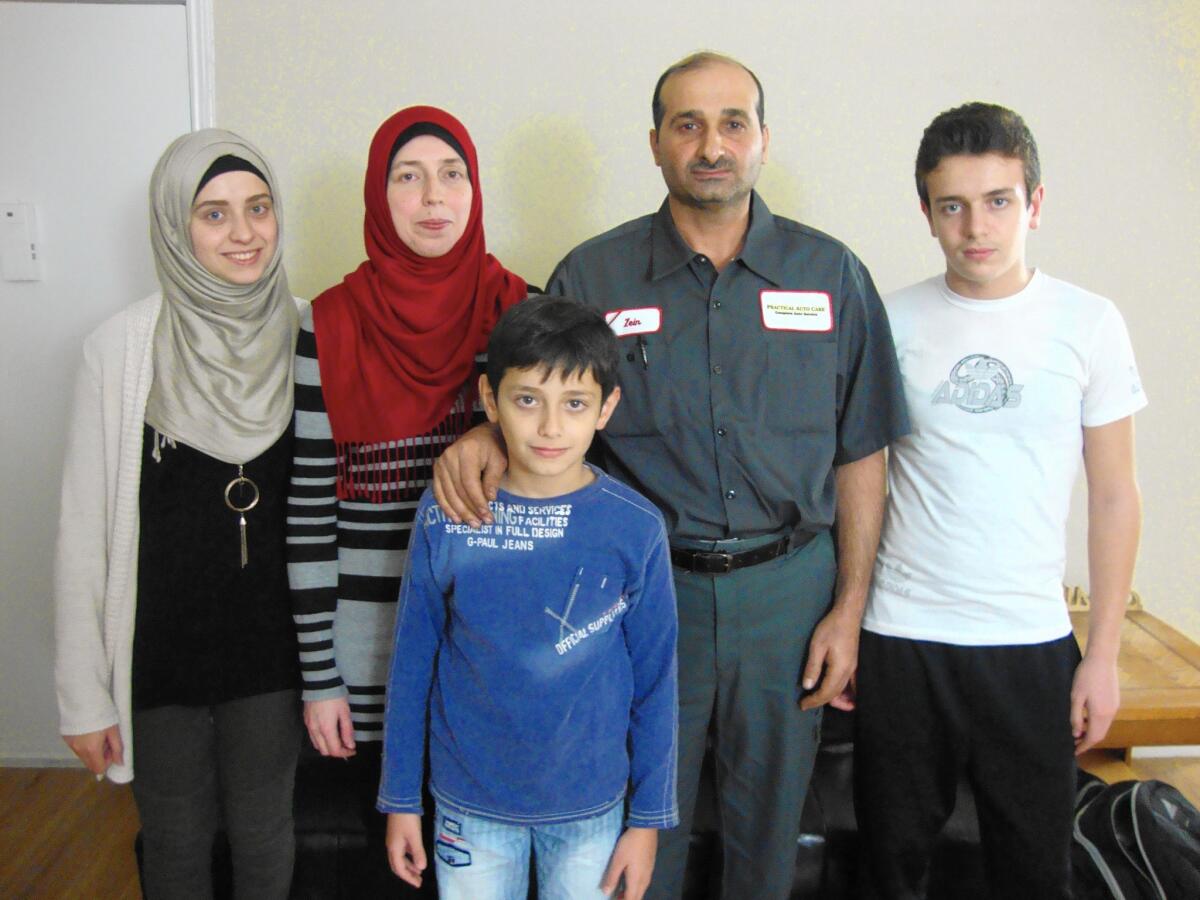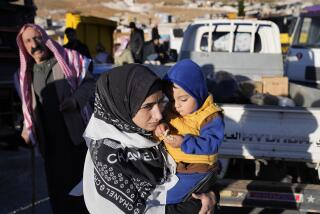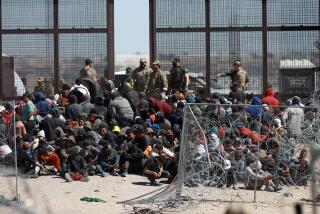Meet two Syrian families in Texas who had the welcome mat pulled out from under them

When the Syrian family of seven was told it would be resettled in the U.S., members rooted for Southern California. They had relatives there and had heard the weather was mild.
Instead, they landed in Texas.
The Muslim family, who asked to be identified only by first names, knew nothing about the Lone Star State when they arrived last December. But life quickly fell into a pleasant suburban routine.
NEWSLETTER: Get the day’s top headlines from Times Editor Davan Maharaj >>
The mother, Lina, 36, who wears a head scarf, remembers the way people on the streets of Houston looked at her. “They smile at you. It really made me feel comfortable.”
Within months, Lina’s husband, Zein, 43, found work as a mechanic. They moved with his 86-year-old mother to a leafy apartment complex, registered the children — ages 10, 11, 14 and 18 — for public school and took them to the popular indoor ice rink at the Galleria mall. Lina even signed up for English classes at a nearby church.
They looked forward to bringing relatives, stranded in Egypt and Lebanon, to join them in Texas.
In the last five years, Texas has taken in more refugees than any other state, including 242 Syrians, the second-highest total after California, which took in 261, according to the State Department. Last fiscal year, the Houston area welcomed 2,164 refugees, more than many states and some countries.
But then came Paris. Days after the terrorist attacks, Gov. Greg Abbott announced that Texas would start refusing Syrian refugees because of security concerns. More than two dozen other state leaders quickly joined Texas. When a relief agency pushed to resettle half a dozen Syrians in Dallas this week, the state filed suit to block their arrival.
Suddenly, the Houston family’s displaced Syrian friends and relatives were calling from the Middle East.
“They’re upset because now they can’t come,” Lina said Wednesday, drinking Arabic coffee in the family’s sparsely furnished living room. “It is unfair for them to blame all the Syrians. All the Syrians want is a safe place to live.”
Lina displayed a photo of the bombed-out ruins of her house and her parents’ in the Syrian city of Homs. Her daughter played a video of Donald Trump on her cellphone. “If I win, they’re going back,” he vowed.
“Not yet,” Lina said, smiling thinly.
Nowhere in the country has the debate over Syrian refugees grown more intense than in Texas.
“Texans, it is in our DNA to exhibit Southern hospitality,” said Bee Moorhead, executive director of Austin-based Texas Impact, a faith-based group working with refugee agencies. “But when politicians ratchet up the rhetoric, the people who maybe are already disposed to bigotry feel like they’ve gotten the license they need.”
Texas Agriculture Commissioner Sid Miller has posted photos on Facebook of refugees and snakes, saying, “Can you tell me which of these rattlers won’t bite you?”
A Dallas-area mosque was picketed by armed protesters. Vandalism was reported at mosques and Islamic centers in west Texas and north of Austin. And at a Presbyterian church that hosts English classes in downtown Austin, a security guard had to repel strangers armed with a knife who came looking for refugees.
“Most of our refugees are pretty freaked out by this,” said Jo Kathryn Quinn, executive director of Caritas of Austin, which resettled about 500 refugees a year from various countries and runs the class that was targeted.
Anne Marie Weiss-Armush, president of DFW International, a network of internationally focused groups based in Dallas, helped coordinate donations for a Syrian family of four in the city whom Texas officials have sued to stop from resettling six relatives.
The father, Faez al Sharaa, 28, works at a Wal-Mart, where his take-home pay is barely enough for monthly bills, supporting family in Syria and repaying the U.S. government for the cost of plane tickets to Texas, she said.
“They are not aware that they are in the middle of this whirlwind that is testing the constitutionality of the governors’ anti-Syrian proclamations,” Weiss-Armush said.
The family’s six relatives were preparing to leave Jordan for Texas on Thursday. They are Al Sharaa’s half-brother Tamam; his wife; their two children, ages 4 and 7; and his parents.
“The clock is ticking,” Weiss-Armush said. “What is the state going to do? Are they going to meet Faez’s brother at the airport and send him away?”
One of Al Sharaa’s Syrian co-workers, Nabil Kalo, 46, has been trying to bring his wife and four children, ages 4 to 14, to Dallas from Turkey for a year and a half. They were approved by the State Department six months ago, he said. Now he’s unsure of their fate.
Some Texas officials have spoken out in support of Syrian refugees, including the mayors of Dallas, Austin and Houston. But Syrian refugees like Lina and her family have not heard that message.
Lina’s sister moved to Chicago last month. Although Illinois Gov. Bruce Rauner rejected Syrian refugees, Chicago Mayor Rahm Emanuel welcomed them, hosting a Thanksgiving dinner Lina’s sister attended.
“To make people even more comfortable, he said Chicago is a city of immigrants and even served dinner to them himself,” Lina said.
The resettlement agency that brought her family to Houston, Catholic Charities, got the family in touch with a restaurant that hosted refugees for Thanksgiving dinner, but no Texas officials showed up to help put them at ease.
Her husband arrived home from work Wednesday and said that if he could get a better job, he would move. He thinks his children will have brighter futures here than in Europe, but so much is uncertain.
“The feeling among the Syrians now is, ‘Where do I go? No one wants me.’”
Somewhere at the back of the family’s apartment an alarm sounded. It was time to pray.
Twitter: @mollyhf
ALSO
For Muslims, another attack means prayer and defending their faith
Fortune struck for these Syrian migrants, but can they make it in California?
Britain launches airstrikes in Syria hours after Parliament authorizes attacks
More to Read
Sign up for Essential California
The most important California stories and recommendations in your inbox every morning.
You may occasionally receive promotional content from the Los Angeles Times.











